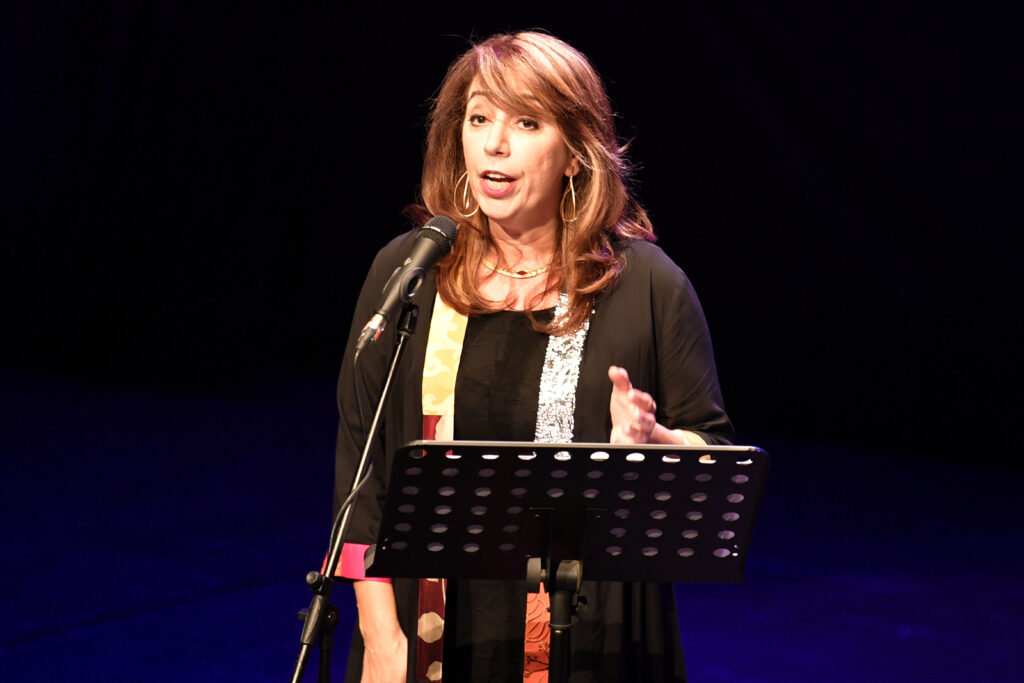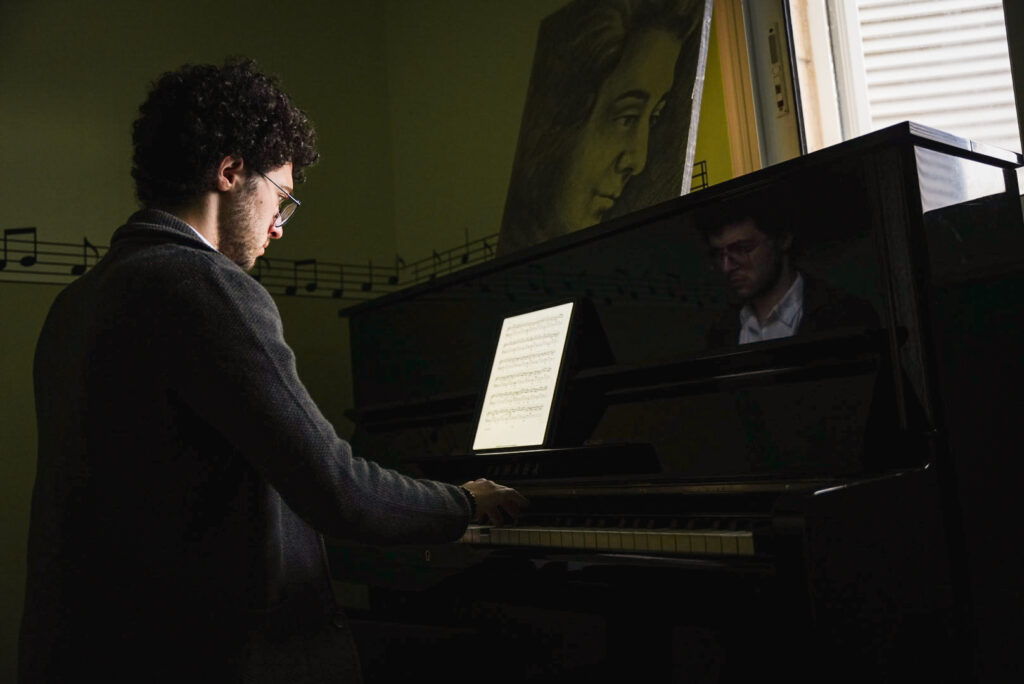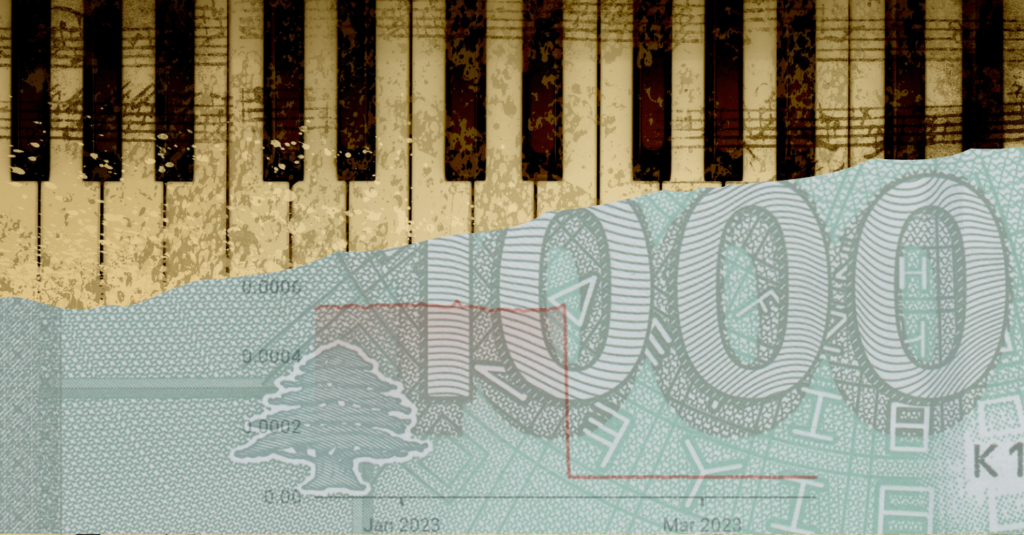“In the past I’ve taught students using the flashlight on my phone it’s been so dark.” This is the sad reality staff like 30-year-old piano teacher Johnny Khalil face at Lebanon’s National Conservatoire. Once an institution at the heart of Lebanon’s classical music scene, it has been without electricity and hot water since 2019, due to lack of money to pay for a generator.
Staff’s wages at the conservatoire have been hit particularly hard. Before the crisis, Khalil earned the equivalent of $1000 a month. He earns the same wage today but it’s only worth $20 to $30, meaning Khalil has been forced to move back in with his parents in Zouk Mosbeh, north of Beirut. “That doesn’t even pay the rent or bills; going to restaurants and eating out has become a dream,” he says. “I can buy food from the supermarket with the money I get, but my meals have changed because you cannot afford meat all the time.”
Worries about money are the top concern for staff. “The economic problems drain your energy,” Khalil says. “As a musician how are you supposed to continue teaching and inspiring students? You feel as though all we are trying to give to the students is neither financially or psychologically rewarding.”
Listen: Lebanese classical music playlist
The economic meltdown in Lebanon is impacting every layer of society. Since 2019 the Lebanese pound has lost 98% of its value. The high black market exchange rates dictate the price of everyday goods, but workers are typically paid in the lower government-set official exchange rate. This, coupled with hyperinflation, has pushed many Lebanese people into poverty. Essential public services like hospitals are struggling to survive and the country has been without a president for over a year. Lebanon is in many ways a failed state in all but name.
Financial pressures and a lack of support from both government and conservatoire administration are impacting the quality of teaching. According to Khalil, staff and students were not provided with computers or tablets to help with online teaching. “In 2022 and 2023 we were given little boxes of rice, milk and oil to cook with. It’s sad and hilarious that the government and the administration think teachers need this box.”
We see our music like a gift that can help Lebanon rise again
Ghada Ghanem

58-year-old opera singer Ghada Ghanem is not your typical conservatoire teacher. She is politically active, having taken part in protests during the 2019 revolution and stood as parliamentary candidate in the 2022 election for the secular Citizens in a State party. Ghanem is currently challenging the National Conservatoire to do more to help its staff. “We feel that we have been left on the side. Music is not a priority in Lebanon; being an artist or an educator is something that nobody cares about. We see our music like a gift that can help Lebanon rise again,” she says.
Ghanem has been in a dispute with the conservatoire administration over pay. “Since January they have stopped paying me because I refused to sign an agreement that I was happy to be paid only $10 to $20 for that month. Are we worth that much money? No! That is not a liveable wage.” Khalil confirmed that since November he had signed these agreements. The Lebanese National Conservatoire was approached to comment but did not respond.
Read: The true cost of ‘pay per stream’
Read more from our global voices here
Ghanem continues to teach her students online, earning money through teaching private lessons and baking bread which she sells in her hometown of Saghbine in Western Lebanon. Ghanem was herself a student at the conservatoire during the Lebanese Civil War, which lasted from 1975 to 1990. “I used music to help me get away from the bombs. I thought I should arm myself with opera,” she says. Comparing today’s crisis with the civil war, Ghanem says: “It’s all the same, during the civil war if you had money you couldn’t go to buy stuff because it wasn’t safe, now you can go out but you don’t have any money.”
Protests against Lebanon’s dire economic situation are frequent. Ghanem and student Michel Draybi have both taken part in protests in the past. “Musicians don’t quite fit with the protests; I’m not going to take my piano out onto the street,” says Draybi. Instead, staff and students at the conservatoire have found an alternative way to protest and raise awareness about their struggles: through concerts.
Music unites people and brings about positive change
Michel Draybi
Since April 2023, Ghanem has organised concerts where spectators can watch members of the conservatories perform live via a small cash donation. This money goes towards, in Ghanem’s words, “strengthening us to grow independently from the collapsing state.” Concerts are arranged throughout the summer, which Draybi plans to perform at. “There is still a place for musicians in society. Through the concerts we can cause a little bit of change,” he says. “Music eases stress and alleviates your soul. It unites people and brings about positive change.”
For 18-year-old student Draybi, from Hadchit in Northern Lebanon, his first year at the conservatoire is drawing to a close. Draybi is studying for a diploma in piano while also studying Mathematics at the Lebanese American University. He is enrolled on a scholarship which covers tuition, accommodation, and a monthly allowance.

Despite his scholarship, Draybi sees the effects of the crisis. “I know one teacher who has stopped taking her medication because her salary doesn’t cover the cost,” he says. “The crisis forces you to worry about things you shouldn’t have to, like your future.”
With classes online, many students are leaving the conservatoire without graduating. Khalil saw several students quit the conservatoire this year: “They were not enjoying it anymore, not even as a hobby. It had become both stressful and boring.”
There does not seem to be much immediate prospect of change in Lebanon, leading millions of Lebanese to consider moving abroad. Khalil plans on joining other teachers who have moved already: “I love this country, but there is no stability for workers. We’ve had teachers leave, I’m waiting for my passport and if I get a visa I will move.”
Ghanem, on the other hand, is determined to remain. “I want to be part of the change. The decision I have made is that I will try and perform in the new Lebanon which I will help make and create.”

